Notes
Related Research Articles
Space rock is a music genre characterized by loose and lengthy song structures centered on instrumental textures that typically produce a hypnotic, otherworldly sound. It may feature distorted and reverberation-laden guitars, minimal drumming, languid vocals, synthesizers, and lyrical themes of outer space and science fiction.

Klaus Schulze was a German electronic music pioneer, composer and musician. He also used the alias Richard Wahnfried and was a member of the Krautrock bands Tangerine Dream, Ash Ra Tempel, and the Cosmic Jokers before launching a solo career consisting of more than 60 albums released across six decades.
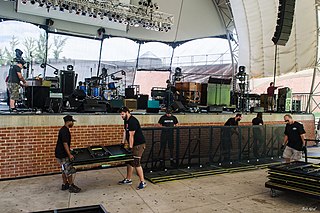
The road crew are the support personnel who travel with a band on tour, usually in sleeper buses, and handle every part of the concert productions except actually performing the music with the musicians. This catch-all term covers many people: tour managers, production managers, stage managers, front of house and monitor engineers, lighting directors, lighting designers, lighting techs, guitar techs, bass techs, drum techs, keyboard techs, pyrotechnicians, security/bodyguards, truck drivers, merchandise crew, and caterers, among others.

Can were a German experimental rock band formed in Cologne in 1968 by Holger Czukay, Irmin Schmidt (keyboards), Michael Karoli (guitar), and Jaki Liebezeit (drums). The group featured several vocalists, including the American Malcolm Mooney (1968–70) and the Japanese Damo Suzuki (1970–73). They have been widely hailed as pioneers of the German krautrock scene.
Krautrock is a broad genre of experimental rock that developed in West Germany in the late 1960s and early 1970s. It originated among artists who blended elements of psychedelic rock, avant-garde composition, and electronic music, among other eclectic sources. Common elements included hypnotic rhythms, extended improvisation, musique concrète techniques, and early synthesizers, while the music generally moved away from the rhythm & blues roots and song structure found in traditional Anglo-American rock music. Prominent groups associated with the krautrock label included Neu!, Can, Faust, Tangerine Dream, Kraftwerk, Cluster, Ash Ra Tempel, Popol Vuh, Amon Düül II and Harmonia.

Seth Brooks Binzer, better known by his stage name Shifty Shellshock, is an American musician, best known for being a co-founder and front man of the rap rock band Crazy Town, known for their hit song "Butterfly". He has also had a solo music career and appeared in the reality television series Celebrity Rehab 1 and 2 and Sober House 1 and 2.

Amon Düül II is a German rock band formed in 1968. The group is generally considered to be one of the pioneers of the West German krautrock scene. Their 1970 album Yeti was described by British magazine The Wire as "one of the cornerstones of ... the entire Krautrock movement".
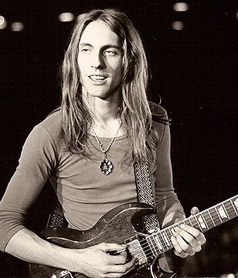
Manuel Göttsching was a German musician and composer.

Agitation Free is a German experimental krautrock band formed in 1967 by Michael "Fame" Günther, Lutz "Lüül" Ulbrich (guitar), Lutz Ludwig Kramer (guitar) and Christopher Franke (drums).
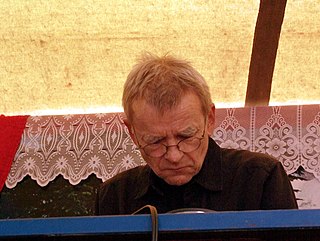
Dieter Moebius was a Swiss-born German electronic musician and composer, best known as a member of the influential krautrock bands Cluster and Harmonia.
Mythos was a German band formed in Berlin by vocalist and multi-instrumentalist Stephan Kaske, bassist Harold Weiße and drummer Thomas Hildebrand in 1969. All doing their A level at the same school, the self-taught musicians released their eponymous debut in 1971. Influenced by Pink Floyd, Ash Ra Tempel and Hawkwind the album draws on science fiction and ecological themes particularly noticeable on the closing track "Encyclopedia Terrae". The release saw the band support Family, Colosseum at a festival and Humble Pie at their show in Berlin 1971, however after three years the band split. Kaske then recruited Axel Brauer on drums and Michael Krantz on bass. The band wrote and played live for two years but failed to record and split up. On his own Kaske signed, as Mythos, to Cosmic Chorus, and recorded various TV and film soundtracks before recording DreamLab in 1975. In 1976 Kaske expanded the lineup to include Sven Dohrow on guitars, Eberhard Seidler on bass and Ronnie Schreinzer on drums. The band adopted a heavier sound and released two albums, Strange Guys and Concrete City. Kaske left the band in 1980 in order to concentrate on setting up his own recording studio in Berlin and pursue solo projects, and released the two albums; Quasar and Grand Prix. Dohrow and Schreinzer formed The Twins, changing to a synthpop style and scoring a number of minor hits.

"Tequila Sunrise" is a song from 1973, written by Don Henley and Glenn Frey, and recorded by the Eagles. It was the first single from the band's second album, Desperado. It peaked at number 64 on the Billboard Hot 100.
German electronic music is a broad musical genre encompassing specific styles such as Electroclash, trance, krautrock and schranz. It is widely considered to have emerged in the late 1960s and early 1970s, becoming increasingly popular in subsequent decades. Originally minimalistic style of electronic music developed into psychedelic and prog rock aspects, techno and electronic dance music. Notable artists include Kraftwerk, Can, Tangerine Dream and Deutsch Amerikanische Freundschaft. German electronic music contributed to a global transition of electronic music from underground art to an international phenomenon, with festivals such as Love Parade, Winterworld and MayDay gaining prominence alongside raves and clubs.
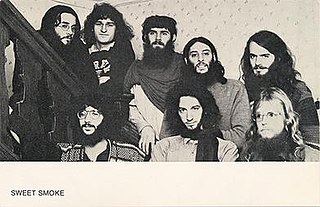
Sweet Smoke was an American rock band formed in Brooklyn, New York, in 1968. The group moved to Europe in 1969, living in Germany, and performing in Germany, the Netherlands and France until 1974 when the band split up. Initially, some members stayed in Europe, some went to India, but most of the band returned to the United States. Although originating in the U.S., Sweet Smoke is often referred to as a Krautrock band. Noted for their buoyant rhythms, inventive improvisations and complex musical structures, in interviews, the group says their music was influenced by Eric Clapton, Jimi Hendrix, Frank Zappa, John Coltrane and The Beatles.

Christmas Album is the sixth studio album by Boney M. It was recorded in the summer of 1981 and released on 23 November 1981. The album, which in certain territories was given the alternate title Christmas with Boney M.

Schwingungen is the second album by the Krautrock band Ash Ra Tempel. It was released in 1972 on Ohr. It has been re-released four times, most recently in 2011 on MG Art Records.

Harald Grosskopf is a German electronic musician. He played with several Krautrock and progressive rock bands of the 1970s in Germany, and released solo music.

Seven Up is the third studio album by German krautrock band Ash Ra Tempel and their only album recorded in collaboration with American psychologist/drug advocate Timothy Leary. It was first released in 1973.
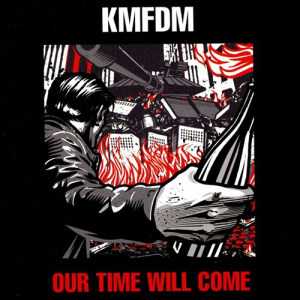
Our Time Will Come is the eighteenth album from German industrial rock band KMFDM. It was released on 14 October 2014 on Metropolis/KMFDM Records on both CD and vinyl.

Michael Duwe, aka Mickie D, is a composer, producer and musician from Berlin, Germany. He is composing music for German television series, documentaries or film. Besides several solo albums, including his 1978 masterpiece ‚Mickie D’s Unicorn, he has worked with different bands, musicians and producers like Agitation Free, Ash Ra Tempel, Klaus Schulze, Michael Hoenig, Michael Shrieve, Wolfgang Loos (Alphaville) or Conny Plank.
References
- ↑ http://surfingtheodyssey.blogspot.de/2015/01/metropolis-1974-metropolis.html Surfingtheodyssey.blogspot.de
- ↑ http://rockinberlin.de/index.php?title=Metropolis (German website)
- ↑ http://rockinberlin.de/index.php?title=Metropolis (German website)
- ↑ McGinnis, Ray (21 August 2019). "Love Becomes Electric by Strange Advance - Vancouver Pop Music" . Retrieved 27 September 2020.
Sources
- Christian Graf: "Rocklexikon Deutschland". Verlag Schwarzkopf & Schwarzkopf, 2002, ISBN 3-89602-273-3
- Steven & Alan Freeman: The crack in the cosmic egg: encyclopedia of Krautrock, Kosmische musik & other progressive, experimental & electronic musics from Germany, 1996, Audition Publ., Leicester ISBN 0-9529506-0-X